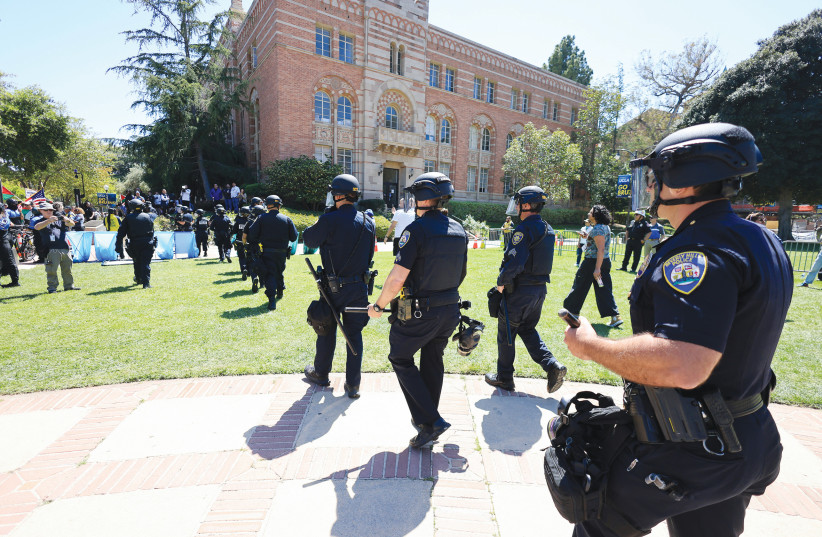Go back to Poland! Zionists deserve to die! Gas the Jews! These are the chants that Jews are hearing throughout the world.
For more stories from The Media Line go to themedialine.org
Take off your kippah! Remove your mezuzah! Hide your Magen David necklace!
Following seven months of relentless campaigning comprising marches, canceling of Jewish creators, bullying of Jews on university campuses, random attacks on Jews in the streets, and a hostile media adopting the Hamas narrative, it has become popular on social media for Jews to make analogies between the antisemitism of the 1930s and today.
Jewish communities are in shock as they reel from the tsunami of antisemitism unleashed on October 7. To suggest that this is the 1930s revisited is both alarmist and a fallacy.
After World War II, the nations that defeated the Nazis attempted to set up a world order where the lessons of the Holocaust would be gleaned. That the new global order as exemplified by the United Nations has failed miserably to achieve the goals of its precursors is not the primary barometer.
Antisemitism in politics

In almost every country, the political establishment will disavow and condemn antisemitism. That there is antagonism towards Israel and by extension, Jews is not denied. But no country apart from Iran and its allies wishes to be tarred with the stain of antisemitism even if its behavior toward Israel often crosses the boundaries. Even rabid antisemites such as Roger Waters and George Galloway deny being antisemitic.
This is in stark contrast to the situation before World War II. Europe was rife with antisemitism. The Jews of pre-war Europe cowered in fear.
Antisemitism has always been present. Sometimes it bubbles under the surface and other times, such as the present, it boils over.
Today, Jews are empowered in most democratic societies to stand up and defend themselves. Many countries have some form of regulatory environment to defend against racism. Are they effective? Not on a practical level. Notwithstanding, racism is eschewed; the challenge is to ensure that history’s oldest manifestation of racism is not excluded.
Israel may be losing the public relations battle when viewed from the lens of the media coverage of the events in Gaza. Yet one can view positively the fact that demonstrators against Israel have aroused widespread resentment for their hooligan-like behavior and antics. A case in point is the chaos on university campuses.
A Harvard CAPS/Harris Poll survey in the United States found that 80% of those polled favor Israel over Hamas. Indeed, many argue that the silent majority in most countries supports Israel.
Jewish communities need to cease being reactive and defeatist. The eruption of antisemitism globally is the conflict being internationalized and to avoid being marginalized, Jewish communities need to stand up.
If Jews wish to demonstrate in Hyde Park London, it should not allow the Metropolitan Police to steer them away if pro-Palestinian demonstrators are present. The brouhaha over Gideon Falter being rebuked by the police for openly wearing a kippah is an example of how to respond.
There was one massive demonstration in Washington held in November where hundreds of thousands of Jews assembled. Why are there not regular demonstrations in New York, Chicago, and Los Angeles where there are large Jewish populations?
Moreover, when Jews have elected to demonstrate they have done so with dignity and an absence of any behavior that could be deemed offensive. Calls for peace and releasing the hostages can be juxtaposed against the calls of “intifada” and “from the river to the sea, Palestine will be free.”
Jewish community leaders need to convey more effectively that freedom of speech and criticism of Israel do not allow for incitement to eradicate Israel and slaughter Jews.
Wherever antisemitism occurs such as the cancellation of Jewish artists or events resulting from pressure from the Boycott, Divestment, and Sanctions crowd, there is a need to employ every means possible to raise awareness that such activities are unacceptable. This pertains to Jews who experience harassment and discrimination. Perhaps it’s time that the Jewish communities respond by creating their own registry of corporations, organizations, and prominent individuals who engage in blatant antisemitic activity.
The tepid response from most universities to the demonstrations, where external forces have been aiding and abetting needs to be tackled from all angles beginning at a government level to supporting Jewish students at the grassroots level.
Jewish philanthropy has supported numerous educational institutions and the arts which are hotbeds of anti-Israel and antisemitic activities. Whereas individual donors have withdrawn their support ad hoc, it is time for communal leaders to galvanize in a more concerted manner.
Communal leaders need to increase their advocacy and build coalitions within societies to combat the Islamist-leftist coalition. In particular, those who adhere to Judeo-Christian values make natural allies.
Jews need to remind not only themselves but society at large that they proudly identify as Zionists who stand with Israel and will defend it against the libels that have been launched against it.
Finally, as Jews mark Holocaust Remembrance Day, commemorating the extermination of 6 million Jews in the Holocaust, they need to reinforce the message: Never Again!
Romy Leibler is a former prominent business and communal leader in Australia now residing in Jerusalem, Israel.
